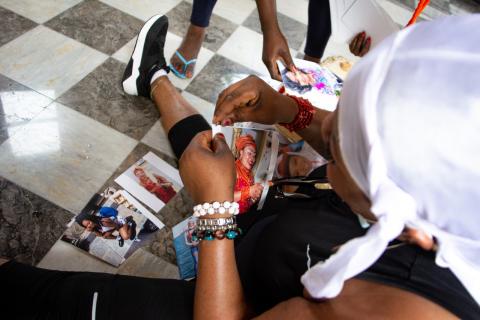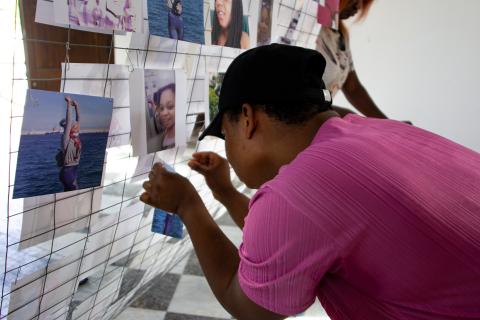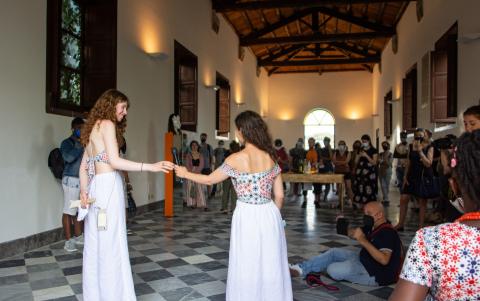PhD fieldwork results in art exhibition exploring stereotypes and representations in research
During fieldwork for her PhD thesis in Palermo, Italy, Maria Shaidrova discovered that the way we do research with or otherwise address migrant communities in the West can be quite patronizing and even colonial. She decided not only to address that in her research but also do something about it. That’s how the conceptual exhibition ILOI (“queen”) was born, which ran in Palermo as a part of a broader range of cultural activities patronized by the municipality. Displayed in one of the most important archeological sites of the city it attracted many visitors including representatives of the local administration and culture. And next year, it will be coming to Tilburg and Amsterdam as well.
Photography: Federica Arrigo
Three years ago, Maria embarked on her PhD journey after receiving an NWO Research Talent Grant from the Dutch Research Council. The initial question guiding her thesis was: why do Nigerian people persistently risk crossing the Mediterranean despite life threatening situations en route and numerous attempts to control and eliminate irregular migration to the EU? Following her research interest, Maria found herself in Benin City, Nigeria – the point of reference for the majority of the Nigerians residing into the EU. Once in Benin, she interacted with those who plan to travel outside Nigeria and those who were “forcefully” returned from Libya after unsuccessful attempts to cross the sea.

The more she learned about the community and Western institutions assisting it, the more she realized how the idea behind her thesis fits the Western inspired counter-migration narrative and that she was unwillingly taking part in the construction of this narrative. She started questioning the idea of “risky” migration in the situation of the absence of any legal possibilities to cross the borders. Instead, she focused on how migration is approached by institutions, researchers, NGOs, and the community itself.
Listening
Being forced to leave Nigeria due to the pandemic, Maria decided to continue her research with Nigerians in Sicily. Yet, her approach to conducting the research changed drastically. Instead of focusing on risks and communication about these risks, she decided to enter into an artistic dialogue with the community where she did not “hunt” for migration narratives and explanations, but attempted to listen and merge her understandings about the life of Nigerians in Europe with the visions and opinions of the community itself.
Contemporary representation of Nigerian women in Italian mainstream media involves, as is often the case with black women, the reproduction of stereotypical images such as those of human trafficking victims, sex workers, migrants or madams (pimps). Europeans’ knowledge and perceptions of their lives are often shaped by a criminal and victimizing narrative. However, says Maria, the migrant community has a right to represent themselves in the way they envision it outside the ‘risky’, ‘victimizing’, and ‘migratory’ narrative prevalent in media, documentary photography and research.

Art exhibition
Maria’s interaction with the Nigerian migrant community in Palermo resulted in the art exhibition “ILOI” (“queen” from Edo language). ILOI aims to tell a different story, the story of a queen. By using conceptual art objects co-created with Nigerian women from Palermo, ILOI seeks to illustrate and question the complex relationship between researchers and respondents, and challenge contemporary representations. The exhibition thus creates a story about contradictions, layers, stereotypes and misunderstandings, but also about the joy which comes from knowing one another.
Conceptual in nature, ILOI attempts to tell the story of this interaction between Nigerian, Italian, Ukrainian, Dutch, and Russian cultures through a variety of artistic reflections initiated by Maria and picked up by a group of artists from all over the world: Avantia Damberg from Curaçao, Alena Ponomareva from Russia, Marta Pagliuca Pelacani from Italy (Florence), and Precious Festus, Precious Sunday, Faith Alex, Faith Festus, Rebecca Kingsley, Joy, Blessing, Unoma, Rosemary from Nigeria and Palermo.

Various media, conceptual objects and interactive performances juxtaposed within the exhibition aim to encourage visitors to join the research and artistic journey of the makers who hope to engender a new perspective on the life of the Nigerian community in Italy. The opening of ILOI took place in the old church of Santa Maria Dello Spasimo on the 27th of June, located in one of the most diverse neighborhoods of Palermo, the Kalsa.
Shaidrova: “What is tackled in ILOI, is the ways in which we look at one another and how these gazes may be questioned to engender new understandings. As organizers and artists, we would like ILOI to grow into a movement of nomadic, collaborative and reflexive exhibition making. Travelling across physical and virtual spaces, ILOI will open the discussion about representations and engage in the dialogue between academics, artists, and the audience in both virtual and physical way.”
Date of publication: 12 August 2021



